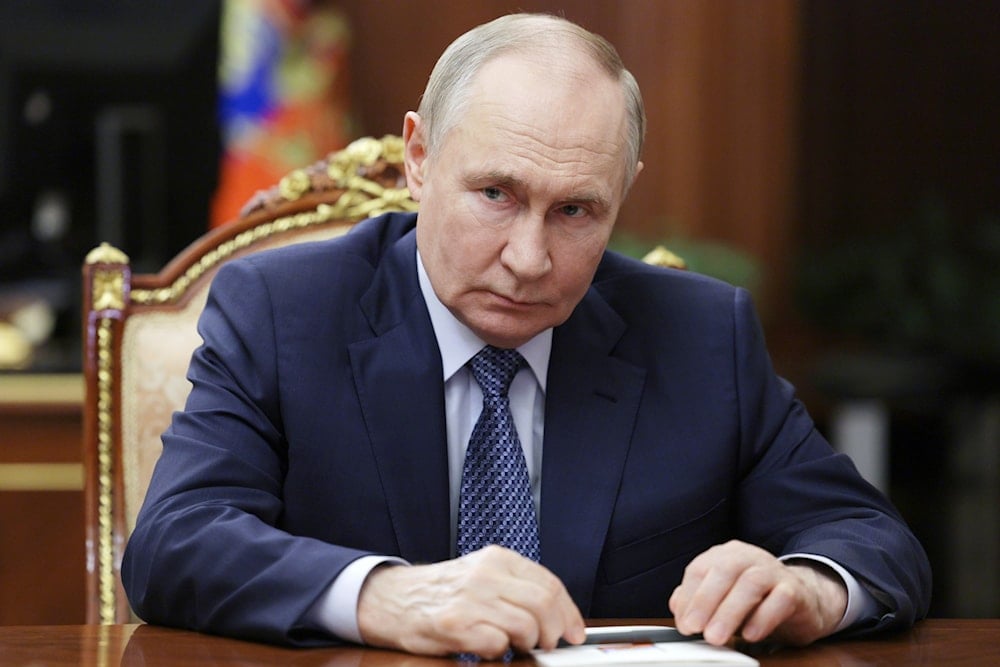Putin questions potency of Trump's ultimatum to end war: Reuters
Putin rejects Trump’s ultimatum, focusing on seizing Donetsk, Lugansk, Zaporizhzhia, and Kherson amid stalled Russia-Ukraine peace talks.
-

Russian President Vladimir Putin speaks with Igor Shuvalov, the chairman of the Russian state development corporation VEB.RF, during their meeting at the Kremlin in Moscow, Russia, Tuesday, Aug. 5, 2025 (AP)
Russian President Vladimir Putin is unlikely to yield to a sanctions ultimatum set by US President Donald Trump, which expires this Friday, and he continues to pursue the objective of fully seizing four regions of Ukraine, sources close to the Kremlin told Reuters.
Trump has warned that he will impose new sanctions on Russia and enforce 100% tariffs on nations purchasing Russian oil, primarily China and India, the largest buyers, unless Putin agrees to a ceasefire in the ongoing war in Ukraine.
Putin's resolve to continue the war stems from his conviction that Russia is gaining the upper hand, as well as his doubt that additional US sanctions will significantly affect Russia, given the multiple rounds of economic penalties imposed over the past three and a half years of conflict, Reuters cited three sources familiar with discussions in the Kremlin as saying.
The Russian leader is reluctant to provoke Trump, and he acknowledges that he may be rejecting an opportunity to ease tensions with Washington and the West, but his military objectives in the war remain his top priority, according to two of the sources.
According to one of the sources, Putin aims to achieve complete control over Ukraine's Donetsk, Lugansk, Zaporizhzhia, and Kherson regions, which Russia has already declared as annexed territory, before entering any negotiations regarding a potential peace settlement.
Fragmented talks
According to the first source, the ongoing negotiation process, which has included three meetings between Russian and Ukrainian representatives since May, represents Moscow's effort to demonstrate to Trump that Putin remains open to dialogue rather than outright rejecting peace, though the discussions have lacked substantive progress beyond talks about humanitarian prisoner exchanges.
Russian officials maintain that they are genuinely committed to reaching a lasting peace agreement through the ongoing negotiations, although they acknowledge the complexity of the process due to the significant divergence between the two sides' positions. Meanwhile, Putin himself characterized the talks as productive during his remarks last week.
Moscow has publicly outlined its conditions for peace, which require Ukraine to completely withdraw its forces from all four contested regions and formally accept neutral status along with restrictions on its military capabilities, terms that Kiev has firmly rejected.
Tension and slackness
The first source told Reuters that Putin has expressed private concerns about the recent worsening of relations with the United States, while still maintaining hope that Russia can rebuild friendly ties with America and restore trade with Western nations. The source noted that "he is worried" about Trump's growing frustration.
According to the source, with Russian forces making battlefield gains and Ukraine facing intense military strain, Putin perceives the current moment as unfavorable for ending the conflict, while also recognizing that neither the Russian public nor the military would support a decision to halt operations at this stage.
According to the second Russian source, while Putin highly values his relationship with Trump and wishes to avoid provoking him, "he simply has a top priority - Putin cannot afford to end the war just because Trump wants it," emphasizing that strategic objectives outweigh diplomatic considerations.
A third source familiar with Kremlin thinking also stated that Russia aims to fully seize all four regions and finds no rationale for halting operations during successful battlefield advances in its summer offensive.
All bark, no bite
The second source described Trump's sanctions threat as "painful and unpleasant" though not catastrophic, while the third source indicated that Moscow's prevailing sentiment is that "there's not much more they can do to us," reflecting a belief that additional Western measures would have a limited impact.
The source noted that it remains uncertain whether Trump would actually enforce his ultimatum, pointing out that "he's made threats before" only to either refrain from action or reconsider his position.
The source added that it seemed unlikely China would comply with Trump's demands to halt Russian oil purchases, warning that such pressure tactics could prove counterproductive by triggering a rise in global oil prices.

 4 Min Read
4 Min Read








